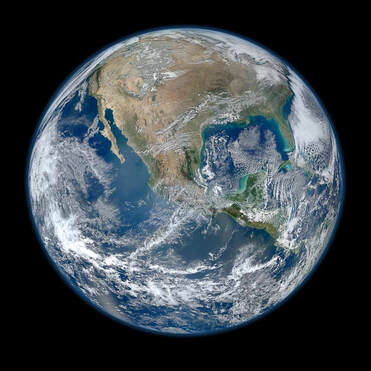 We all have a part to play in regenerating the planet we share,
We all have a part to play in regenerating the planet we share, and Earth Month seems a good time to start. Image: NASA
APRIL is Earth Month – a time to pause and think about the condition of the extraordinary planet on which we miraculously find ourselves as humans in 2022.
The list of human-caused problems on Earth is long. We can all feel anxious and overwhelmed, regardless of our age. But more than ever before we need to lead by example, listen to our young people and encourage them to ‘think outside the square’. We all need to think and act differently to help us tackle these big issues together.
To me, there is a very clear message in Earth Month in 2022: Sustainability is no longer enough. We need to think and act Regeneratively, in every decision we make.
Rather than be overwhelmed, how about thinking during this Earth Month, and beyond, of ways you can change your own life to help regenerate Bass Coast?
You could start on an individual level with that basic health advice your doctor has been giving you all these years about good diet, plenty of exercise and relaxation. This all links in with regenerating our environment. You may not be the sort of person who can go out onto a farm in cold, wet weather to help plant thousands of indigenous plants, or into reserves to dig out noxious weeds. But there are many small things all of us can do.
On a recent podcast I heard one prominent Systems theorist say: "The most important thing you can do for the planet right now is to grow at least some of your own food, and as organically as possible. If you need to eat, then you need to grow food."
No space for a garden bed, or access to a community garden, or even a grassed road verge on which to grow food? You could grow some herbs in pots to flavour your food and thus minimise the amount of processed food you might otherwise buy to get the yummy artificial flavours. Of course many herbs have medicinal and nutritional benefits as well. After all, it’s healthier for you, your family and the planet to grow, share and eat fresh food whenever possible.
For organic food we cannot grow ourselves or exchange with others, we have wonderful local farmers’ markets and some organic food retail outlets, where the fruit and vegies do not come wrapped in plastic either.
When you buy a plastic product or one wrapped in plastic ask yourself: "Am I 'wishcycling' here? Is this actually going to be recycled of the 3 million tonnes of plastic waste Australia produces each year?" No doubt Australia is doing much better at recycling in but reducing is better for the planet. Visit the council website to find out what happens to the various sorts of waste in Bass Coast.
We are fortunate in Bass Coast to have lots of ways of cutting down plastic packaging. Many retail outlets sell beautiful cloth shopping bags, string bags and cane baskets of all sorts. Although it’s better to avoid the plastic wrappers in the first place, most soft plastics can be recycled through the Redcycle bins in many supermarkets and other outlets. So save those soft plastics and drop them off when you are shopping, rather than put them in your red bin.
You could also reduce the use of toxic household chemicals in your own life. The Internet and many books are full of excellent information to help you do this. If you are really ‘old school’, you could try the 1861 Mrs Beeton's Book of Household Management, modern prints of which are available through the library service.
A good way to start is with a household chemicals audit – just as you would when working out how to lower your energy use. Both of these audits are excellent activities for the young people in your life to help with. Check out what nasty chemicals you may be using or storing in your laundry, garden shed, cleaning products cupboard, workshop, garage, kitchen and bathroom. Don't just throw this nasty stuff in your red bin! Check with the council on the best way to dispose of it.
When purchasing any 'natural' product, do your research – not all 'natural' products are equal, as some require rather nasty chemicals to convert them to a usable form.
Living in Bass Coast is ideal in many ways. We have clean air; clean water; lots of beautiful places to walk, cycle or run; a thriving arts and cultural community; interesting tourist places to visit; wonderful landscapes and seascapes, and so on. But it also has its challenges. Having the crowds around at various times throughout the year can be downright stressful! Maybe you could think of regenerative ways of making your own street and town more liveable and relaxing during the busiest times?
These are just some of the relatively simple regenerative practices we can all adopt. Explore our wonderful Bass Coast community and see what is out there to help you detoxify your own life, regenerate your community, Bass Coast and planet Earth.
There is lots for all of us in Bass Coast to think about, discuss and act upon during Earth Month, and throughout the year.